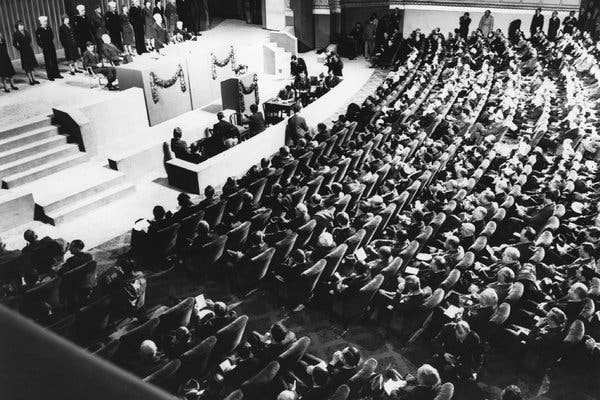ECOSOC at 80: Renewing Multilateralism in an Age of Global Uncertainty
On 23 January, the United Nations Economic and Social Council (ECOSOC) convened a commemorative session…
Multilateralism – a 15 letter word that is getting a 75-year anniversary. The United Nations hits 75 at a moment when the world should be most reminded of the need for peace, stability and cooperation. Whether it is the role of the World Health Organisation of the UN to help coordinate response to coronavirus, or the leadership of emergency response in the face of a plague of locusts in Eastern Africa by the Food and Agriculture Organisation, or the front line efforts of the World Food Programme in Yemen, the world is better for trying to tackle tough problems together.
Just like climate change, these aren’t easy problems. The UN is often skewered for being ineffective, but let’s be realistic, if an issue is at the UN, it is already a thorny difficult global one. It is a little like…
“Many forms of Government have been tried and will be tried in this world of sin and woe. No one pretends that democracy is perfect or all-wise. Indeed, it has been said that democracy is the worst form of Government except for all those other forms that have been tried from time to time.…”
Winston S Churchill, 11 November 1947
The UN was born out of World War II. On 24 October 1945, 51 nations came together to establish the UN to prevent another war, forming a new organization for world peace. Today, with a membership of 193 states, the UN has evolved into an agency not only for achieving world peace but also increasing cooperation among the nations to tackle some of the world’s most pressing needs. The UN’s work today covers a myriad of issues such as peace and security, climate change, sustainable development, human rights, disarmament, terrorism, humanitarian and health emergencies, gender equality, governance, food production, and more.

Its hard to imagine where we would be with the discussions on biodiversity without the Rio Conference, over 30 years ago, when issues of sustainability were first raised. Or as concerning as COVID-19 is, imagine a world without WHO’s efforts to coordinate a response at a global level.
As it hits its 75th anniversary, we should all pause to be thankful for multilateralism. Without question, the world is in an imperfect place, but it is certainly better for having coordinated attempts to address its challenges than none at all. For as much as we see challenges, the world is improved compared to when it came out of World War II. Perhaps shoring up its most vital institution of global cooperation is the best investment we can make to regain lost ground of the past few years.
The rational reaction to increasing numbers of hungry, geopolitical conflict, coronavirus, and the state of our oceans is to improve the UN and be thankful for the gains made to date on women’s literacy, global poverty, and identifying planetary boundaries.
October 24 has been celebrated as the United Nations Day and is observed by member states as a public holiday. To mark its 75th anniversary, the UN has adopted the theme ‘2020 and Beyond: Shaping our future together’ and is planning to host the largest global conversation on the role of global cooperation in building the future we want. Throughout the year, the UN will work with partners to initiate dialogues within and across borders, sectors and generations. The aim is to reach as many people as possible: to listen to their hopes and fears; learn from their experiences; and empower them to think and act globally. You can be part of the conversation by following the hashtag #UN75 and using the Media Toolkit.